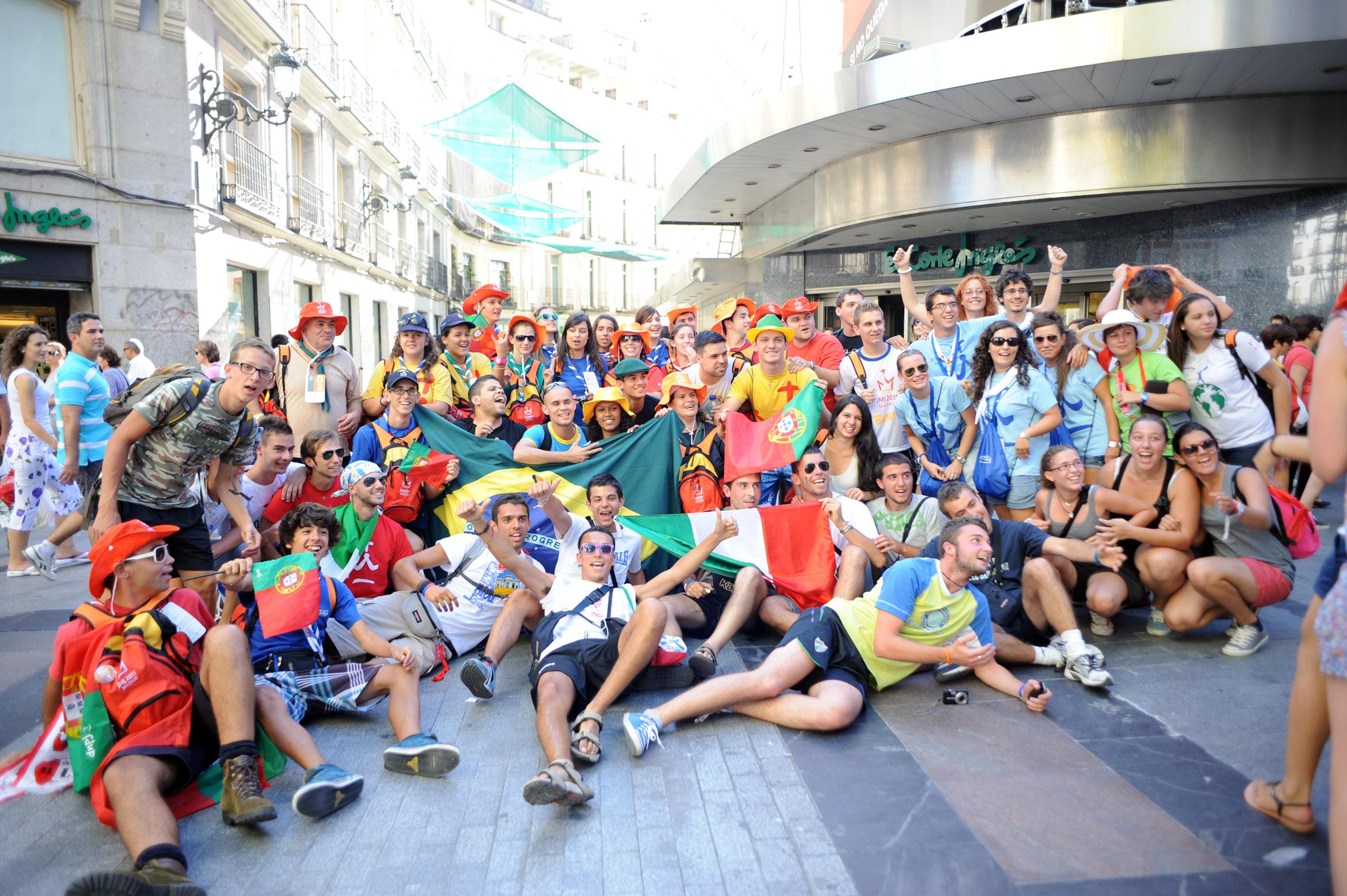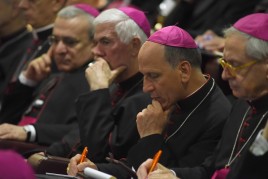On a journey
The year 2018 begins with an agenda full of meetings with the young protagonists: the Synod themed “Young people, the faith and vocational discernment” in October will be preceded by Pope Francis’ meeting with young people in August and by the pre-synod meeting in March with 300 young people from world countries, believers and non-believers alike. It will be a time of listening and dialogue with young people that equally involves the realm of adults. Interview with Fr Michele Falabretti, director of the National Service for the Pastoral Care of Young people (SNPG) of the Italian Bishops’ Conference – CEI

The year 2018 of the Church will be devoted to young people: a time for listening and dialogue with an agenda full of meetings whose highlights include the XV Ordinary General Assembly of the Bishops’ Synod planned for October 3rd – until the 28th – on Young People, the Faith, and Vocational Discernment. A “Synod for and of all young people”, Pope Francis said. Against this backdrop will be held the pre-Synod meeting (March 19 – 24) with some 300 young people of all Christian religious denominations and confessions, including non-believers. On March 25, Palm Sunday, the 33rd World Youth Day will be celebrated in Saint Peter’s at diocesan level. Another highlight of this year’s agenda is the meeting of Italian youths with Pope Francis in Rome on August 11-12, that will conclude a week of pilgrimages to religious sites in the Country. Less than three months after the Synod the 34th WYD will take place in Panama (January 22-27 2019).
 But the year 2018 will also call into question the realm of adults, pointed out Fr Michele Falabretti – director of the CEI National Service for the Pastoral Care of Young People (Snpg) – with clarity and with a certain degree of ‘mea culpa’: “let us stop centring our reflections on young people as if they were part of a distant realm. In fact they act as chemistry reagents: when we look at them they show us who we truly are. In this respect the Pope’s words to the Roman Curia for the traditional presentation of Christmas greetings bears special significance: “to give special attention to young people does not mean considering them alone. It also means expanding a critical theme, owing to a combination of relationships and pressing issues such as intergenerational relations, the family, pastoral work, social life, and so forth…”. In other words
But the year 2018 will also call into question the realm of adults, pointed out Fr Michele Falabretti – director of the CEI National Service for the Pastoral Care of Young People (Snpg) – with clarity and with a certain degree of ‘mea culpa’: “let us stop centring our reflections on young people as if they were part of a distant realm. In fact they act as chemistry reagents: when we look at them they show us who we truly are. In this respect the Pope’s words to the Roman Curia for the traditional presentation of Christmas greetings bears special significance: “to give special attention to young people does not mean considering them alone. It also means expanding a critical theme, owing to a combination of relationships and pressing issues such as intergenerational relations, the family, pastoral work, social life, and so forth…”. In other words
We focus on young people not to study them but to listen to them
because they allow us to understand the Church and the adults that generated them. Inter-generational dialogue helps us adults understand what world we intend to build together with the young.”
 Could the year 2018 usher in a renewed communication with the young generation, perhaps by adopting new languages? It’s not a question of languages. There’s no point in beating around the bush. If today young people seek meaning and significance in their lives it’s also because we are no longer credible. As adults we should stop believing we are right, that we represent the depository of truth and of the Gospel. Young people are telling us that we have lost our way, that we take our faith for granted while we should be brave enough to re-read it.
Could the year 2018 usher in a renewed communication with the young generation, perhaps by adopting new languages? It’s not a question of languages. There’s no point in beating around the bush. If today young people seek meaning and significance in their lives it’s also because we are no longer credible. As adults we should stop believing we are right, that we represent the depository of truth and of the Gospel. Young people are telling us that we have lost our way, that we take our faith for granted while we should be brave enough to re-read it.
To be even clearer: what are young people’s requests to adults? To be more radical. We need a radical commitment even though we fear it, for it requires us to lead a coherent life that we know we are not leading and that we thus ought to seek. This radical commitment requires our constant conversion directed towards the heart of the Gospel. This is the witness to be borne; conversely from the act of whitewashing our words and embellishing them with some gesture of good will.
There emerges the need for coherence.
Anything can be said of the young, to the extent of accusing them, but it would be wrong to say that this is the world they had wanted. In fact it’s the world they have found.
We continue bypassing the distance separating the needs of the Gospel and everyday life in the belief that it can be ignored. Young people are asking us to show that the Gospel is worth living by. If it’s not worthwhile for us why should it be worthwhile for them?
A “Synod for all and of all young people”, Pope Francis said on many occasions. Today the Church wishes be a Church that listens to the young generations like never before … With no doubt, in this respect the meeting of March 19-24, ahead of the Synod, bears special significance. It will be an occasion to listen to the young, as will the Synod, and be open to their questions. In fact it indicates a pastoral style.
We don’t need pastoral expedients; what we need is to recover a style and be open to listen to contemporary youths.
 In the month of August Italian young people will be meeting with Pope Francis. What do you expect from this event? The August meeting is the first gathering of Italian youths with Pope Francis after more than four years since his election and ahead of the Bishops’ Synod, which the Italian Church has always prayed for. I am looking forward to it, to know what the Pope will say to Italian youths and how the latter will approach the Holy Father, and, above all, if they will want to preserve a bond with him and with the Church.
In the month of August Italian young people will be meeting with Pope Francis. What do you expect from this event? The August meeting is the first gathering of Italian youths with Pope Francis after more than four years since his election and ahead of the Bishops’ Synod, which the Italian Church has always prayed for. I am looking forward to it, to know what the Pope will say to Italian youths and how the latter will approach the Holy Father, and, above all, if they will want to preserve a bond with him and with the Church.
Priests, educators and those responsible for formation will accompany the youths in their pilgrimage. Will it be a testing ground for them too? Going on pilgrimage is a testing ground not only for our body but also for our mission as educators and shepherds. As we walk we are not always ahead of the flock. Sometimes we have to walk behind and accept our physical weakness. But this centres our role as educators and shepherds which sometimes is at the lead, other times it’s in the middle, and other times still it means walking behind.
The 2018 marathon of meetings will accompany young people up to the WYD in Panama, in January 2019. At that point returning to the ordinary pace could constitute the first major difficulty of the post-Synodal phase… The WYD in Panama, where there is growing anticipation, highlights the Church’s ability to speak and to reach out to small Countries in the peripheries of the world, which have something beautiful to share.
Even in the most remote corners of the world man continues his quest for the meaning of life. The great majority of Italian youths will not be going to Panama; they will follow the WYD through broadcasted images and social media. This too is a way to be together, to communicate and to pray.
Going back to the ordinary is a commitment passed down by the Synod. It is our responsibility to make it concrete and thriving.
At the beginning of this important year what is your hope for the pastoral care of Italian youths? That it may be a true journey, without expecting to map everything out before hand. I’m not referring to the Synod Assembly but to all those who at local level raise questions on cross-generational dialogue and the generational capacity of our communities. If it is to be a journey then it must be a journey that is capable of stirring attentive listening, that is able to put us into a crisis in a healthy way. Ultimately, one last thing should be recovered …
What? On December 7 1965, at the end of Vatican II, the Council Fathers wrote to world youths that the Church had worked also to rejuvenate her image. It would be beautiful if in this journey directed to the young the Synod helped the Church rejuvenate herself, recover her dynamism, dreams and impetus.